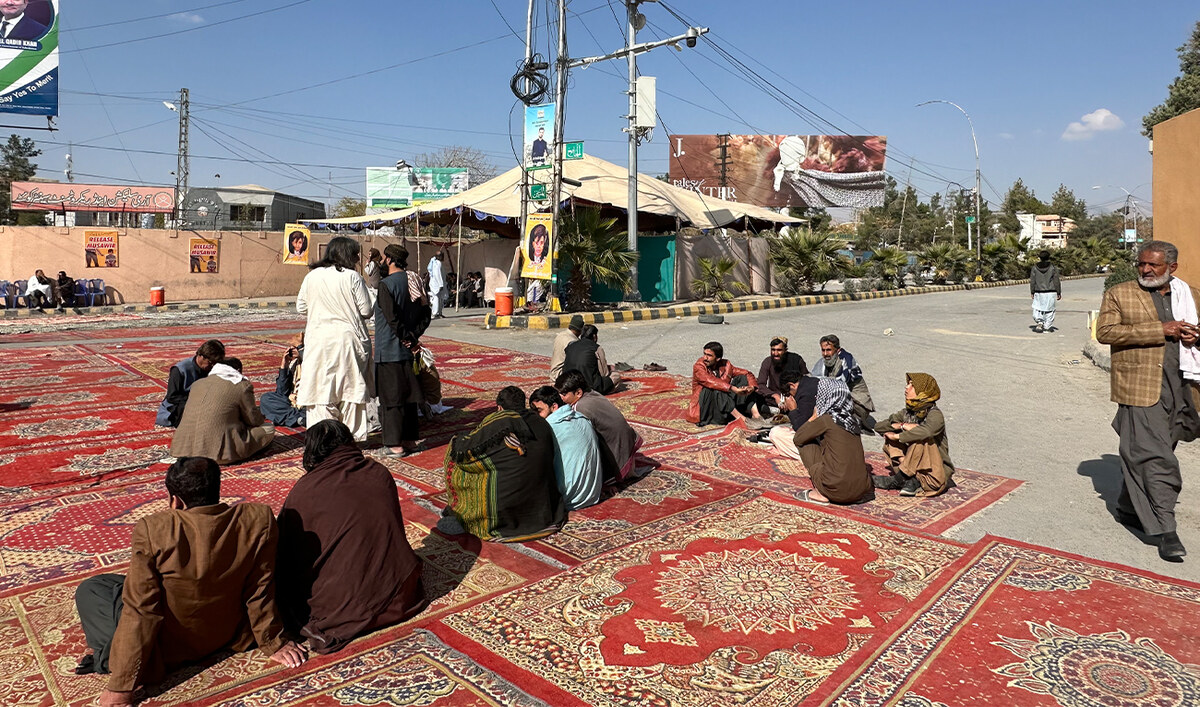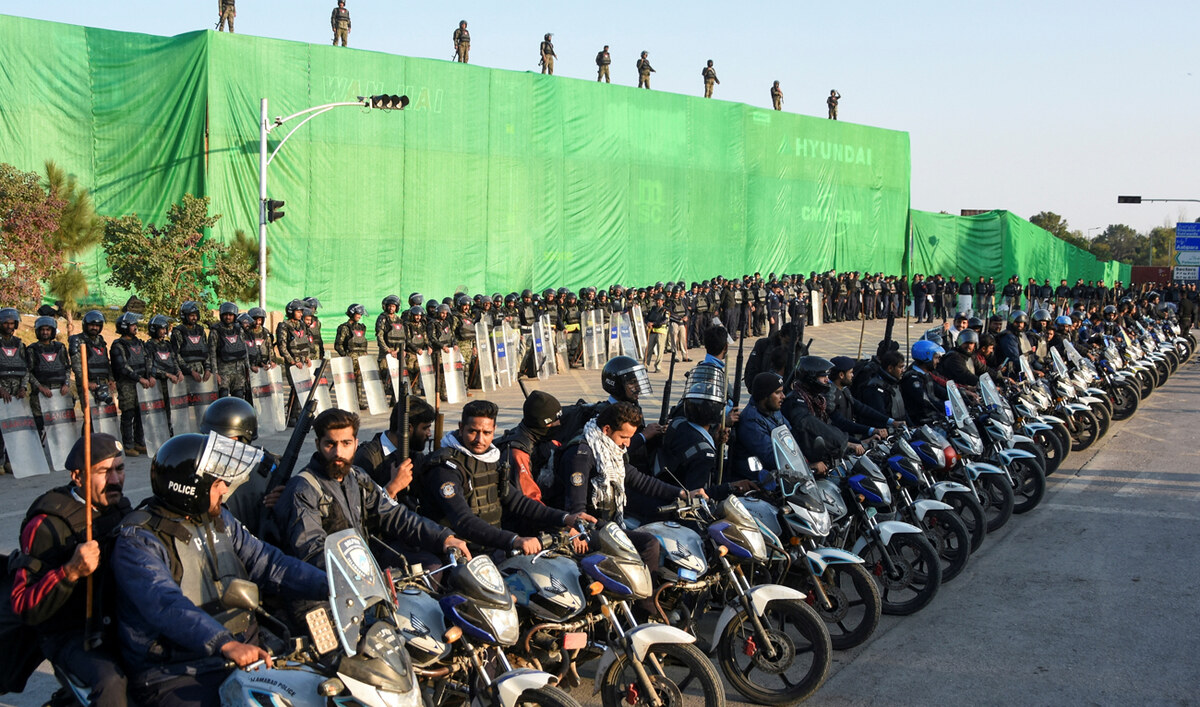ISLAMABAD: Punjab Information Minister Azma Bukhari said on Monday one police constable had been killed and five were critically injured in violence by supporters of jailed former premier Imran Khan’s Pakistan Tehreek-e-Insaf (PTI) party, which is leading a protest march to the federal capital of Islamabad.
Thousands of rallygoers reached the edges of Islamabad on Monday, after protest caravans set out from various parts of the country a day earlier to call for the release of political prisoners, including Khan, among other demands.
The protesters set out despite the government refusing to grant the PTI permission to enter Islamabad for a sit-in. Last week, the district administration also imposed a two-month ban on public gatherings in the capital, citing security challenges and inconvenience to the public. Earlier this year, parliament also passed a new law to regulate public assembly in Islamabad, which laid out, among other rules, that any party or group wanting to hold a protest would need permission from the administration and could only assemble at a designated venue and during set timings.
Authorities have closed all schools in Islamabad and the adjacent garrison city of Rawalpindi, while the Internet and WhatsApp messaging services have also slowed as the protest march continues. All routes connecting Islamabad and Rawalpindi have been completely shut for the last two days, as are highways and roads from other cities leading to the federal capital.
Addressing a press conference in Lahore, the provincial capital of Punjab, Bukhari said one policeman had been killed in clashes with PTI supporters.
“FC [Frointier Corps] soldier Samiullah sustained a gunshot wound to the leg in Sargodha. In Kati Pahari on the Attock Motorway, [police] Constable Wajid was shot in the neck and arm and is in critical condition,” the minister said, only giving the first names of officers.
“In Wah Cantt [in Rawalpindi district], the injured include Sub-Inspector Farooq and Sub-Inspector Zohaib, while Constable Mubashir has lost his life. Five people remain in critical condition.”
She added that 70 people had been wounded in clashes with the protesters just outside Islamabad, while there were reports of several other clashes elsewhere in the province.
Interior Minister Mohsin Naqvi said those responsible for the killing of the policeman would be brought to justice.
Khan’s party said scores of its workers were also hurt.
“TILL MY LAST BREATH”
The PTI march started on Sunday but could not reach Islamabad as shipping containers placed by the government on key points on major highways slowed the pace of the caravans. The PTI says its final destination is D-Chowk, a high-security area in the capital’s Red Zone that houses key government buildings and is a popular site for protests. Heavy contingents of police and other security forces have been stationed across Islamabad and at entry and exit points.
The largest PTI protest caravan began its journey from Peshawar, the provincial capital of the Khyber Pakhtunkhwa (KP) province where Khan’s party is in power. It is being led by KP Chief Minister Ali Amin Gandapur and Khan’s wife Bushra Khan, who was released on bail in October after nearly nine months in detention.
Khan has been in jail since August last year and faces a slew of charges he says are politically motivated.
On Monday evening, the PTI said in a text to reporters that the rally had “broken through one of the biggest barrages of containers and is at the gate of Islamabad.”
“Until Khan does not return to us, we will not end this march,” Bushra said to supporters from atop the protest caravan as the PTI edged closer to Islamabad. “I will stand there till my last breath, you people have to stand by me. I will keep standing even if nobody does because this does not concern just my husband but the country and its leader.”
Islamabad police confirmed over 400 arrests related to the protest in the past few days, saying the detainees were being held in different police stations. The PTI said over 3,500 of its leaders and supporters had been arrested in connection to the protests.
PTI leader Shaukat Yousafzai, who is part of the caravan, told Arab News over the phone the march would carry on until it reached D-Chowk.
“We will only return from D-Chowk when Imran Khan and other innocent party workers are released from Pakistani prisons,” he said.
The PTI also said key leaders Gohar Khan and Ali Mohammad Khan had been allowed to meet the PTI flounder at Adiala jail, but no details were shared about the focus or outcome of the discussions.
The PTI’s march has coincided with a visit to Islamabad by Belarusian President Aleksandr Lukashenko and a 68-member delegation to discuss investment deals. The government has accused the PTI of trying to sabotage the foreign visit in a bid to destabilize its economic recovery efforts.
Yousafzai rejected this criticism, saying his party had called the protest well before the Belarusian delegation’s arrival was announced.
“We have not blocked the roads,” he added. “The government has blocked the roads, creating a situation like this. The government should have held talks with the PTI instead of blocking the roads.”
KP government spokesperson Muhammad Ali Saif also said the PTI planned to hold a “protracted protest.”
“We are advancing according to our plan and are not in a hurry,” he said. “The government should prepare food supplies for the police for several days because we won’t stop until our demands are met.”
A report prepared by Pakistan’s ministry of finance and released on Sunday estimated economic losses of Rs190 billion ($684 million) per day due to political protests.





















